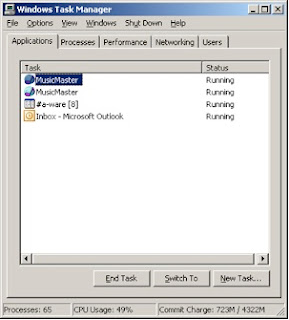MusicMaster Blog
Three Important Lessons in Caring for Your MusicMaster Database posted on February 18th, 2011
by Marianne Burkett
This article is about properly caring for your database.
Today we take a look at three different scenarios where clients run into trouble.
Scenario A:
The Program is not responding normally to commands. You stroll to your desk on Monday morning and try to open the database and get this message:
 The very first thing to do when you see this message is to check your Windows Task Manager. If you’re uncertain about how to open the Task Manager you can press “Control-Alt-Delete” simultaneously and it will come up. You can also right click on any gray space on your Task Bar and you’ll find it on the menu that pops up there. Once you have the Task Manager open, check the Applications tab and see which programs are running. You may see MusicMaster running twice.
The very first thing to do when you see this message is to check your Windows Task Manager. If you’re uncertain about how to open the Task Manager you can press “Control-Alt-Delete” simultaneously and it will come up. You can also right click on any gray space on your Task Bar and you’ll find it on the menu that pops up there. Once you have the Task Manager open, check the Applications tab and see which programs are running. You may see MusicMaster running twice.
 Simply close both instances using the Task Manager. If you network your data, make sure nobody else in your network is accessing the database. If need be, check the task manager of each workstation capable of opening the database. After you are certain nobody else is accessing the database, reopen MusicMaster and run Tools/Purge. If that does not clear up your errors, contact your Music Scheduling Consultant.
Simply close both instances using the Task Manager. If you network your data, make sure nobody else in your network is accessing the database. If need be, check the task manager of each workstation capable of opening the database. After you are certain nobody else is accessing the database, reopen MusicMaster and run Tools/Purge. If that does not clear up your errors, contact your Music Scheduling Consultant.
Scenario B:
Closing MusicMaster improperly during a scheduling session. If for some reason, you’re in the middle of a scheduling session, running the auto scheduler or editing logs and you experience a sudden power outage or your computer freezes up and you have to reboot. This can cause errors in the database. In most of these cases, you’ll need to call your Music Scheduling consultant right away or restore your most recent backup. This is why I always stress the importance of doing daily backups of the database. Tools-Backup-Create a Standard Backup. Only attempt backups when the database is being accessed by one user!
Scenario C:
Database is bloated and sluggish. There is no politically correct way to put this, but if you don’t Automatically Purge your log history, your database will grow like someone on the “All Fast Food Diet.” The larger it gets, the slower it performs. Check your default settings at Dataset-Schedule-Purge History and make sure it is set to “Automatically Purge.” By default, we set it at 90 days and 8 song histories.
 It’s really up to you. As you increase the number of days (these are logs you can access via the Schedule Editor), your database will become larger. Purging log histories simply means your song histories are archived. You don’t lose your histories!
It’s really up to you. As you increase the number of days (these are logs you can access via the Schedule Editor), your database will become larger. Purging log histories simply means your song histories are archived. You don’t lose your histories!
I do not recommend having less that 20 days of active logs. When running your history purge, do NOT interrupt the software. It may look like it’s not working, but be patient and allow the purge to process. Once the purge is completed the utility will disappear. At that point, run Tools-Purge to get the database down to its optimum size.
Understanding how to care for your databases, doing daily backups and taking proper care of your Windows system overall health will yield trouble-free Music scheduling. If you have any questions or concerns, feel free to contact the Support Team at MusicMaster.

